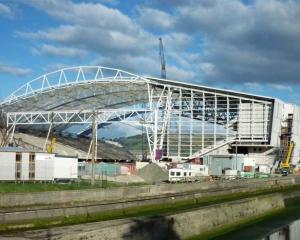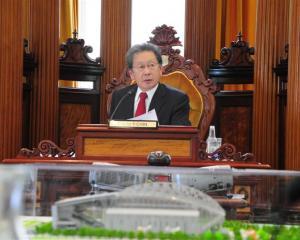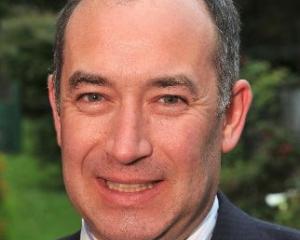23 December 2008
PRIVATE AND CONFIDENTIAL
Hon Bill English
MP for Clutha/Southland
Minister of Finance, Minister for Infrastructure
Deputy Prime Minister
Deputy Leader
Parliament Buildings
Molesworth Street
Wellington 6160
Dear Mr English
The purpose of this letter is to request central government support for the proposed multi-purpose covered stadium at Awatea Street in Dunedin.
The proposed Awatea Stadium would be one of the largest capital developments to take place in Dunedin City in the Otago region. It is anticipated that the construction period would last 25 months and that a substantive benefit will accrue to the local building industry as they will be involved in its construction. Specific details follow in this letter, but it is important to note that the building consents in Dunedin for the calendar year ended November 2008 compared to the calendar year ended November 2007 are down by 10%. Resource consents processed on a monthly basis for 2008 compared to 2007 are also down by approximately 10%. With the current global situation, there is a degree of uncertainty as to whether there will be sufficient work to continue full employment in the building and construction area at historical levels.
After years of consultation and consent process approvals, the Dunedin City Council's Long Term Council Community Plan for the next decade includes funding for four major projects which will assist in keeping the local building industry going. These projects are Stage 2 of the Tahuna Wastewater Upgrade which will see secondary treatment put in place. This work has a value of $62 million and will be tendered early next year with a primary benefit to specialist firms in the secondary wastewater treatment area. The Otago Settlers Museum is undergoing a redevelopment project between 2008 and 2012 with a value of $37 million. This is essential work to ensure that the artefacts are stored appropriately and presented in a form and to a standard that the public expects. Work is due to commence in the New Year on a $45 million upgrade of the Dunedin Town Hall, the bulk of which is for health and safety, including fire compliance reasons. Later in the decade there are planned improvements to the library network and existing buildings which have not been upgraded or touched since they were opened in 1981.
However, the proposed Awatea Street Stadium at $188 million will be the largest project. Dunedin City Council's contribution is $88 million plus a maintenance fund of $6.4 million, to be established on completion. This project will take 25 months. The Council has already bought the land. A decision from planning commissioners on a plan change is expected by Christmas, or at the very latest, first thing in the New Year, to enable the project to occur.
Appeals to the Environment Court are likely and will be heard in May 2009. We are confident there will be a successful outcome and work will start in July 2009. The major issue left to be
resolved is the question of private sector fundraising which will be returned to later in this letter.
The construction cost (excluding land) is $165.4 million and the Councils expect a guaranteed maximum price to be achieved for this budget figure. Indications from Hawkins, the contractor which is tendering work in the market at the moment, as well as feedback from the members of the CST project delivery team, confirms that this is an achievable result. The majority of the construction expenditure will be linked to building and sub-contract trades for firms within the Otago Southland region and also, to a lesser extent, the rest of New Zealand.
The University is proposing to construct buildings simultaneously with the stadium and there will be synergies for the building industry and construction prices with this work. Their proposed buildings are essential for them to meet their planned capital expenditure programme to meet the growing demand for tertiary services and courses within the Otago region and to meet accommodation shortfall problems. Should the stadium not proceed their building programme would require significant re-work and there would be some significant issues for the University in meeting their accommodation needs as suitable land is in short supply to them.
Insofar as construction impacts are concerned, the stadium is estimated to support a minimum of approximately 600 people based on experiences with the Westpac Stadium and independent advice. Earlier work undertaken by BERL relating to the potential economic costs and benefits for upgrading Carisbrook suggest that up to 75% of the construction value would be sourced from within the Otago and broader southern region. This suggests $124 million worth of the $165.4 million construction cost will be sourced from local construction companies, building trade sub-contractors, sub-trades and other related service industries. In addition to this, the Stadium would require ongoing maintenance during its estimated 50 year life of approximately $37.5 million (non-inflation adjusted figure) which would provide work for the general building trade, electrical contractors, painters, specialists such as turf and lighting, business, paint manufacturers and so on during the life of the stadium.
The Carisbrook Stadium Trust sought registrations of interest from sub-contractors and suppliers in October. These registrations of interest have been passed on to Hawkins Construction who are actively tendering for work at the moment. If a contractor hasn't registered they are not prevented from participating in the tenders. It is expected by the Carisbrook Stadium Trust that the local contract and sub-trades in the Otago-Southland area will be successful in undertaking the work under the head contractor which is likely to be Hawkins Construction Ltd if they perform through the current phase of the work. This project will provide a great certainty of work in the current uncertain economic conditions.
The commencement of this project will also see the realignment of the State Highway which will involve further work for contract firms such as Works Infrastructure and Fulton Hogan. All of this work combined is likely to stimulate the demand for Polytech students to enrol in construction related courses and also potentially provide an additional reason for school leavers thinking of a career in the construction, manufacturing and industrial trades to stay in the region as there could be three to five years work between this and other projects referred to earlier.
The Dunedin City Council's Chief Executive had a discussion with the Hon John Carter at a Society of Local Government Managers Conference held in Paihia in September 2008. Mr Carter indicated that the National Party might be interested in the infrastructure area and possibly extending the projects that could qualify for central government assistance beyond roading/transport to areas such as water and wastewater supply and possibly stormwater. These could be referred to as core infrastructure, and an example of this is the Tahuna Wastewater plant secondary treatment upgrade. This is estimated to be worth $62 million which is necessary to meet environmental standards expected in the 21st century. Private sector firms will be competing for this work.
The remaining substantial hurdle is the achievement of the private sector fundraising which has proved more difficult in the current economic climate than all parties behind this project anticipated. It is important to note that the Dunedin City Councillors have set a 60% threshold of the $45.4 million to be signed up by way of conditional contracts by February 2009. Currently the Carisbrook Stadium Trust projections indicate that the private funding is likely to be $15 million short of the target by late January 2009. In the future this gap will close based on the experience of fundraising for the Westpac Stadium. The project is $35 million short at present ($15 million private funding and $20 million in mitigating DCC/ORC ratepayer costs). The Council has actively pursued the opportunities attached to this letter for reducing the $20 million, and to date we have not been successful.
A crucial set of meetings are set down to consider whether or not to proceed in late January, early February 2009. It would be valuable to have an interim response by then from the Government as to how it may wish to be involved in supporting the proposed stadium. Initial suggestions for possible involvement are set out below:
1 National funding for the realignment of SH88 and the stadium to improve safety and congestion at the University of Otago, and in the city generally (total project cost $33.1m, DCC share $11.6m in today's dollar)
2 Equity share in the Dunedin City Council's Housing portfolio (current value $70m)
3 Suspensory loan or interest free loan.
4 An underwrite of the private funding convertible to a suspensory loan (does not deal with the Council's $20m mitigation)
5 Government grant
6 Cost sharing for approved infrastructure (eg Tahuna Wastewater Treatment plant upgrade $62m).
We recognise the difficulties in timeframe and process terms, however, we wish to work with relevant officials on these opportunities to meet the late January 2009 timeframe if possible.
We understand the Government's appropriate processes and would fully expect to work through them. Please note that the project's Stakeholders Group (with representatives from the Carisbrook Stadium Trust, Dunedin City Council, Otago Regional Council and the University of Otago) will be meeting on 29 January 2009 to consider recommendations to the Councils.
The Mayors of the Otago and Southland regions are sending you a separate letter in support of the Government's involvement in the stadium. Enclosed is a DVD which has been prepared by the Otago/Southland regions in support of their bid to host World Cup rugby games. In many ways it captures the co-operative approach evident in this part of the world and the importance of having a quality venue in which to celebrate rugby and other major events in the years ahead.
We look forward to hearing from you.
Yours sincerely
Peter Chin
Mayor, Dunedin City Council
Stephen Cairns
Chairperson, Otago Regional Council






